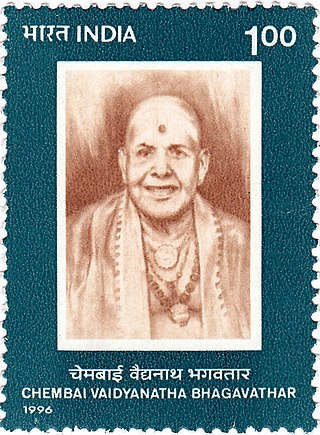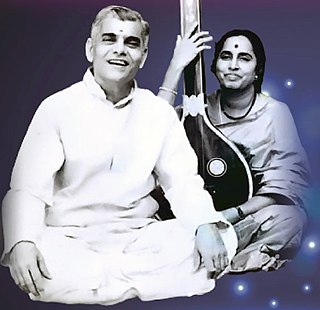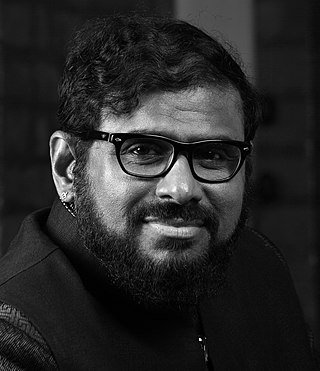Related Research Articles
Swathi Thirunal Rama Varma was the Maharaja of the Kingdom of Travancore. He is also considered as a brilliant music composer and is credited with over 400 classical compositions in both Carnatic and Hindustani style.

Hanumatodi, more popularly known as Todi, is a rāgam in Carnatic music. It is the 8th melakarta rāgam in the 72 melakarta rāgam system. This is sung very often in concerts. It is a difficult rāgam to perform in owing to its complexity in prayoga. It is called Janatodi in Muthuswami Dikshitar school of Carnatic music. Its Western equivalent is the Phrygian mode. Todi in Carnatic music is different from Todi (thaat) of Hindustani music. The equivalent of the Hindustani raga Todi in Carnatic music is Shubhapantuvarali. The equivalent of Carnatic Todi in Hindustani is Bhairavi thaat in terms of notes, but the two sound very different due to differing uses of gamakas.

Varṇam is a type of composition in the Carnatic music system that encapsulates the key features of a raga, and considered as a foundational element in the learning path. Varnams capture the essence of the ragam in terms of typical swara patterns used, vishesha prayogas, highlighting the main notes, etc. This forms the basis for creative presentation (manodharma) of the raga in the form of raga aalapana, kalpana swarams and neraval.

Semmangudi Radhakrishna Srinivasa Iyer was an Indian Carnatic vocalist. He was the youngest recipient of the Sangeetha Kalanidhi awarded by the Music Academy in 1947, a distinction he holds to this day as of 2023, probably the only musician to receive that honour before reaching 40. He had received many other awards as well, including Padma Bhushan and Padma Vibhushan from the Government of India, Rajyasevanirata title from Travancore's erstwhile ruling family, Sangeet Natak Academy award (1953), Isai Perarignar from Government of Tamil Nadu and Kalidas Samman from Government of Madhya Pradesh. He was affectionately addressed as "Semmangudi Maama" by his disciples. He was also considered the "Pitamaha" or the grand sire of modern Carnatic Music. He was conferred with an honorary doctorate by University of Kerala in 1979.
Palghat Rama Bhagavathar was an Indian musician.
Harikesanallur Muthiah Bhagavatar, commonly known as Muthiah Bhagavatar, is one of Carnatic classical music's famous twentieth-century composers. He also created about 20 ragas.

Sundaram Balachander was an Indian veena player and filmmaker. He directed, produced, and also composed music for a few of his films. Balachander was awarded the Padma Bhushan in 1982. He died of a heart attack at the age of 63, while on a music tour of India.

Chembai Vaidyanatha Bhagavatar was an Indian Carnatic music singer from Kerala. He was born in Kozhikode, and moved to Palakkad along with him family during his childhood. He is popularly known as Chembai, or sometimes simply as Bhagavatar. Chembai was noted for his powerful voice and majestic style of singing. His first public performance was in 1904, when he was nine. A recipient of several titles and honours, he was known for his encouragement of upcoming musicians and ability to spot new talent. He was responsible for popularising compositions like Rakshamam Saranagatam and Pavana Guru, among others.

Palghat Kollengode Viswanathan Narayanaswamy, often referred to as K. V. Narayanaswamy was an Indian musician, widely considered to be among the finest Carnatic music vocalists of the 20th century. He was awarded the Madras Music Academy's Sangeetha Kalanidhi in 1986. He was described as the "Perfect Knight" of Carnatic music, a phrase from Geoffrey Chaucer, by V. K. Narayana Menon, art critic of India and recipient of the Sangeet Natak Akademi Fellowship.

Thanjavur Quartet were four brothers, Chinnayya, Ponnayya, Sivanandam and Vadivelu, who lived during the early 19th century and contributed to the development of Bharatanatyam and Carnatic music.
Paapanaasam Raamayya Sivan was an Indian composer of Carnatic music and a singer. He was awarded the Madras Music Academy's Sangeetha Kalanidhi in 1971. He was also a film score composer in Kannada cinema as well as Tamil cinema in the 1930s and 1940s.

Ramesh Narayan is an Indian classical vocalist, composer and music producer who works predominantly in Malayalam cinema. He belongs to the Mewati gharana of Hindustani classical music. Narayan began his initial training in Carnatic music and later mastered the classical Hindustani style under the renowned Pandit Jasraj.

Swathi Sangeethotsavam is a ten-day festival of music celebrating the compositions of Maharaja Swathi Thirunal. The festival is held from 4 to 13 January every year at Kuthira Malika, Trivandrum, where the Maharaja is believed to have composed many of his works. The festival is a tribute to Swathi Tirunal and is exclusively dedicated to his compositions. The concerts are not ticketed. The festival is conducted by Rama Varma Maharaja of Travancore Trust under the helm of Prince Rama Varma.

Neyyattinkara Vasudevan was a Carnatic music vocalist from Kerala in south India. The Padmasree-winning Carnatic vocalist and disciple of Semmangudi Srinivasa Iyer and Ramnad Krishnan, he combined tradition and innovation in his widely acclaimed career. Vasudevan is famous as being one of the first from the Dalit community to excel in the field which was previously the preserve of the upper castes.

Thanu Krishna Murthy, better known as T. K. Murthy, is an Indian mridangam player. Murthy is a Padma Shri and Sangeetha Kalanidhi awardee.

Mohanakalyani is a rāgam in Carnatic music. It is a janya rāgam from the 65th melakarta scale Mechakalyani. It is a janya scale, as it does not have all the seven swaras in the ascending scale. It is a combination of the pentatonic scale Mohanam and the Melakarta raga scale Kalyani. This ragam can be considered as a Prati Madhyamam equivalent of Bilahari, the janya of 29th Melakartha Dheerashankarabharanam. The equivalent of Mohanakalyani in Hindustani music is Bhoop Kalyan or Shuddha Kalyan. Bhoop Kalyan belongs to the Kalyan thaat of Hindustani music. Similar to Mohanakalyani, Bhoop Kalyan is a combination of Bhoop and Kalyan. This rāgam is believed to be invented by Swati Tirunal Maharaja.
K. P. Kittappa Pillai was the son of Sangita Kalanidhi K. Ponniah Pillai (1888-1945), a scion of the famous Tanjore Quartet, codifiers of the Bharatanatyam format.
Kizhakke Potta Udayabhanu was an Indian playback singer and music director, mainly in Malayalam films. In 2009, he was awarded the Padma Shri, India's fourth highest civilian honour.

Moolam Thirunal Sethu Parvathi Bayi (1896–1983), better known as Amma Maharani, was the Junior Maharani (Queen) of Travancore as well as a promoter of Indian Classical music. She was the mother of Chithira Thirunal Balarama Varma, the last King of Travancore. She was the president of the National Council of Women in India in 1938–1944.

Lalitha Bhanu was a Carnatic singer. She has also sung a few songs for Malayalam and Tamil films as a playback singer.
References
- ↑ Rolf, Killius (2006). Ritual Music and Hindu Rituals of Kerala. New Delhi: BR Rhythms. ISBN 81-88827-07-X.
- ↑ Composers and Musicians, Palghat Parameswara Bhagavathar (1815-1892), Swathi Thiurnal